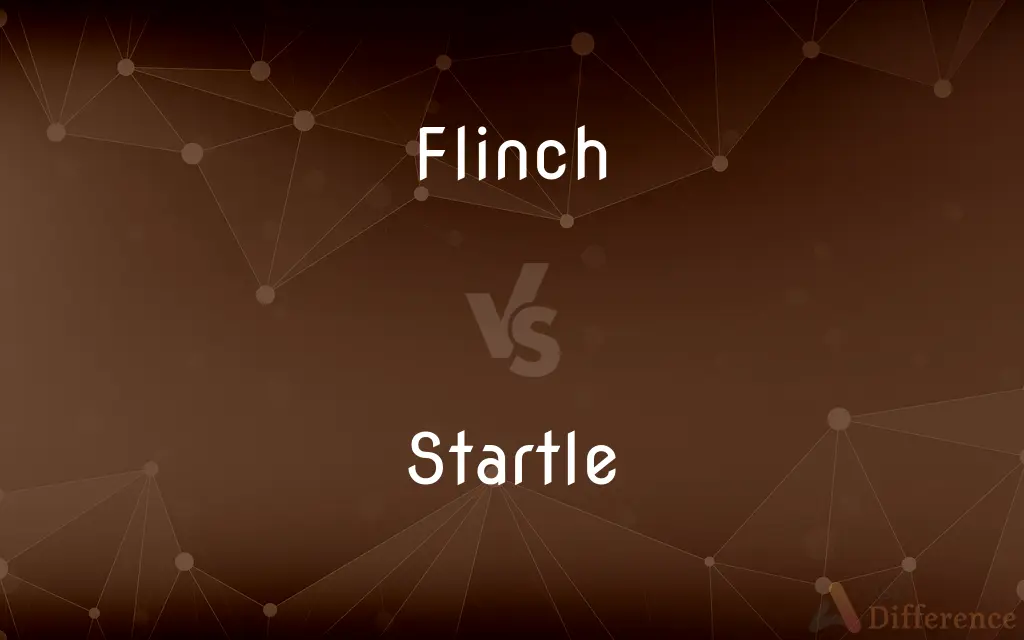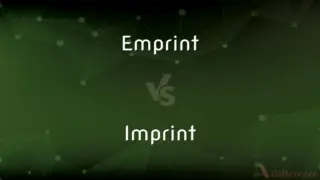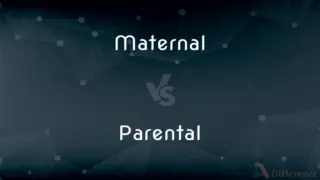Flinch vs. Startle — What's the Difference?
By Urooj Arif & Fiza Rafique — Updated on March 26, 2024
Flinching is a quick, involuntary reaction to something perceived as threatening or painful, emphasizing a defensive response, while startling is a sudden shock or surprise reaction to an unexpected event or noise, highlighting an alert response.

Difference Between Flinch and Startle
Table of Contents
ADVERTISEMENT
Key Differences
Flinching involves a quick, often slight, movement away from something that is instinctively seen as a threat or source of discomfort. It's a protective reaction that minimizes potential harm or prepares the body for impact, typically triggered by the anticipation of something unpleasant, such as pain or danger. On the other hand, startling occurs in response to an unexpected stimulus, such as a loud noise or a sudden appearance, leading to a brief, involuntary reaction that might include jumping, screaming, or a sudden increase in heart rate. This response is more about being caught off guard than about preparing to avoid harm.
While both flinching and startling are involuntary and can be considered part of the body's rapid defense mechanisms, flinching is more closely related to avoiding or mitigating expected physical harm. For example, someone might flinch when they see an object coming towards them rapidly. In contrast, startling does not necessarily relate to direct physical threats but can be triggered by any sudden, unexpected event, like an alarm going off suddenly.
The physical manifestations of flinching and startling can overlap, but the intent behind them differentiates the two. Flinching is a defensive mechanism aimed at protecting oneself from anticipated harm, possibly leading to defensive actions such as closing the eyes or recoiling. Startling, however, serves as an alert mechanism, quickly orienting an individual's attention towards an unexpected stimulus, which can result in a broader range of physical reactions, from jumping to turning towards the source of surprise.
Both responses are rooted in the human body's fight-or-flight system, activated by the amygdala in the brain, which processes emotional responses, including fear. However, the context and nature of the stimuli that trigger these reactions vary. Flinching often involves a personal space or physical integrity invasion, while startling is a reaction to any sudden or surprising stimulus, regardless of its threat level.
Despite their differences, both flinching and startling play crucial roles in human survival and adaptation. Flinching can prevent injuries by prompting individuals to move away from potential sources of harm, while startling enhances awareness and readiness in response to unexpected situations. Understanding these reactions helps in comprehending how humans navigate and respond to their environments, emphasizing the body's innate mechanisms for protection and adaptation.
ADVERTISEMENT
Comparison Chart
Definition
A quick, defensive reaction to a perceived threat or discomfort.
A sudden shock or surprise reaction to an unexpected stimulus.
Trigger
Anticipation of pain, danger, or discomfort.
Unexpected events or noises.
Primary Purpose
To avoid or minimize potential harm.
To alert and orient to a new stimulus.
Typical Response
Recoiling, closing eyes, protecting oneself.
Jumping, screaming, increased heart rate.
Relation to Threat
Directly related to avoiding harm.
Related to sudden awareness, not direct harm.
Compare with Definitions
Flinch
Quick movement away from harm.
She flinched when the doctor administered the shot.
Startle
Sudden reaction to surprise.
The loud noise made her startle.
Flinch
Protective reaction to threat.
He flinched as the bee buzzed close to his face.
Startle
Alert mechanism to new stimuli.
The baby startled at the sound of the dog barking.
Flinch
Involuntary defense mechanism.
I flinched when I saw the ball coming towards me.
Startle
Shock response to sudden events.
They startled when the fireworks went off without warning.
Flinch
Physical response to potential pain.
She flinched when the hot water splashed her skin.
Startle
Involuntary response to the unexpected.
He startled when the door slammed shut unexpectedly.
Flinch
Anticipatory action against discomfort.
He flinched at the sight of the needle.
Startle
Quick orientation towards stimulus.
She startled and turned towards the sudden crash.
Flinch
To start or wince involuntarily, as from surprise or pain.
Startle
To cause to make a quick involuntary movement or start.
Flinch
To recoil, as from something unpleasant or difficult; shrink.
Startle
To alarm, frighten, or surprise suddenly.
Flinch
An act or instance of starting, wincing, or recoiling.
Startle
To become alarmed, frightened, or surprised.
Flinch
A reflexive jerking away.
My eye doctor hates the flinch I have every time he tries to get near my eyes.
Startle
A sudden, brief episode of fear.
Flinch
(croquet) The slipping of the foot from a ball, when attempting to give a tight croquet.
Startle
A sudden, involuntary movement in response to something frightening or unexpected, such as a noise.
Flinch
(intransitive) To make a sudden, involuntary movement in response to a (usually negative) stimulus; to cringe.
Startle
(intransitive) To move suddenly, or be excited, on feeling alarm; to start.
A horse that startles easily
Flinch
To dodge (a question), to avoid an unpleasant task or duty
Startle
(transitive) To excite by sudden alarm, surprise, or apprehension; to frighten suddenly and not seriously; to alarm; to surprise.
Flinch
(croquet) To let the foot slip from a ball, when attempting to give a tight croquet.
Startle
To deter; to cause to deviate.
Flinch
To withdraw from any suffering or undertaking, from pain or danger; to fail in doing or perserving; to show signs of yielding or of suffering; to shrink; to wince; as, one of the parties flinched from the combat.
A child, by a constant course of kindness, may be accustomed to bear very rough usage without flinching or complaining.
Startle
A sudden motion or shock caused by an unexpected alarm, surprise, or apprehension of danger.
Flinch
To let the foot slip from a ball, when attempting to give a tight croquet.
Startle
To move suddenly, or be excited, on feeling alarm; to start.
Why shrinks the soulBack on herself, and startles at destruction?
Flinch
The act of flinching.
Startle
To excite by sudden alarm, surprise, or apprehension; to frighten suddenly and not seriously; to alarm; to surprise.
The supposition, at least, that angels do sometimes assume bodies need not startle us.
Flinch
A reflex response to sudden pain
Startle
To deter; to cause to deviate.
Startle
A sudden motion or shock caused by an unexpected alarm, surprise, or apprehension of danger.
After having recovered from my first startle, I was very well pleased with the accident.
Startle
A sudden involuntary movement;
He awoke with a start
Startle
To stimulate to action ;
..startled him awake
Galvanized into action
Startle
Move or jump suddenly, as if in surprise or alarm;
She startled when I walked into the room
Common Curiosities
Can a person flinch and startle at the same time?
Yes, a person can both flinch and startle simultaneously, especially if an unexpected event also poses a perceived threat.
Is flinching a learned behavior?
While flinching can be influenced by experiences, it is primarily an innate, involuntary protective reaction.
Do animals also flinch and startle?
Yes, many animals exhibit flinching and startling behaviors as part of their survival mechanisms, reacting to threats and unexpected stimuli.
Are startle reactions the same across different cultures?
The basic physiological startle reaction is universal, but cultural factors can influence the expression and perception of startle responses.
What is the main difference between flinching and startling?
The main difference lies in their triggers and purposes: flinching is a defensive reaction to anticipated harm, while startling is a shock response to unexpected stimuli.
Why do people flinch?
People flinch as an instinctive effort to protect themselves from anticipated harm or discomfort.
What causes someone to startle?
Startling is caused by sudden, unexpected stimuli that catch a person off guard, leading to a rapid, involuntary reaction.
Can loud noises always cause startling?
While loud noises are a common trigger for startling, individual responses can vary based on expectation, familiarity, and sensitivity to sound.
How do flinching and startling contribute to survival?
These reactions enhance survival by preparing the body to avoid harm (flinching) and by increasing awareness of and readiness for unexpected situations (startling).
Can flinching be controlled?
While flinching is an involuntary reaction, people can train themselves to react less noticeably through repeated exposure and conditioning.
Is it possible to become desensitized to startling stimuli?
Yes, through repeated exposure to the same stimuli, individuals can become desensitized, leading to less pronounced startle reactions.
What role does the brain play in flinching and startling?
The amygdala and other brain regions involved in processing fear and emotional responses play key roles in triggering both flinching and startling.
How do startle responses vary among individuals?
Startle responses can vary based on individual sensitivities, previous experiences, and even genetic factors influencing nervous system reactivity.
Can anxiety affect flinching and startling responses?
Yes, anxiety can heighten sensitivity to stimuli, potentially leading to more frequent or intense flinching and startling responses.
What therapies can help manage excessive flinching or startling?
Therapies focusing on relaxation techniques, exposure therapy, and cognitive-behavioral strategies can help manage excessive flinching or startling.
Share Your Discovery

Previous Comparison
Emprint vs. Imprint
Next Comparison
Maternal vs. ParentalAuthor Spotlight
Written by
Urooj ArifUrooj is a skilled content writer at Ask Difference, known for her exceptional ability to simplify complex topics into engaging and informative content. With a passion for research and a flair for clear, concise writing, she consistently delivers articles that resonate with our diverse audience.
Co-written by
Fiza RafiqueFiza Rafique is a skilled content writer at AskDifference.com, where she meticulously refines and enhances written pieces. Drawing from her vast editorial expertise, Fiza ensures clarity, accuracy, and precision in every article. Passionate about language, she continually seeks to elevate the quality of content for readers worldwide.















































